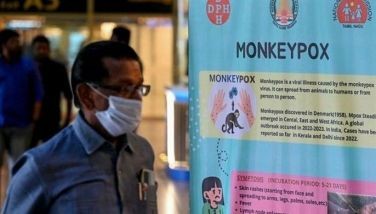Cambodian opposition chief resigns from party
PHNOM PENH — The head of Cambodia's opposition party announced his resignation from the group on Saturday in apparent response to plans by the country's long-serving prime minister for a law that could lead to the party's dissolution.
Sam Rainsy announced his resignation in a letter to senior members of his Cambodia National Rescue Party, or CNRP.
"In all circumstances I continue to cherish and to uphold the CNRP's ideals in my heart," he said on his Facebook page.
His action came after Prime Minister Hun Sen earlier this month vowed to amend the laws on political parties to keep convicts from holding leadership positions, among other rules.
Sam Rainsy has been in self-imposed exile since late 2015 to avoid a deferred two-year prison sentence for criminal defamation. He has been the target of several lawsuits by Hun Sen and his ruling Cambodian People's Party, or CPP.
Just this past Thursday, a Cambodian appeals court upheld a lower court ruling that found Sam Rainsy guilty of defamation for alleging that a senior government official sought to inflate Hun Sen's online popularity by buying "likes" for his Facebook page.
The opposition says the lawsuits are without merit, and just a legal ploy to try to cripple it. Cambodia's courts are widely seen as being under the influence of Hun Sen and his party.
The opposition party's deputy chief and acting head, Kem Sokha, has faced similar legal attacks, but has exchanged conciliatory words and gestures with Hun Sen in recent months. Hun Sen has a history of using a carrot-and-stick approach to successfully divide his opponents.
Cambodia will hold local elections in June. Sam Rainsy is the opposition's most dynamic and popular figure, and virtually embodies the opposition in challenging Hun Sen for more than two decades.
"The rubber-stamp National Assembly under the control of the CPP is preparing a new 'law' to expediently dissolve the CNRP by pointing at me as the pretext," Sam Rainsy said on Facebook. "This law aimed to institutionalize a one-party system is being tailor-made for me — in my capacity as CNRP president — since the CNRP is the only opposition party represented at the National Assembly and the only party that can defeat the CPP."
"But this anti-Sam Rainsy law will have little impact on Cambodian politics: Whatever my position in the party, I remain the symbol and embody the spirit of resistance to the autocratic and corrupt Hun Sen regime, and this is what matters in the minds of the Khmer people," he said.
A general election is scheduled for 2018.
Ou Virak, head of the Phnom Penh-based think tank Future Forum, said he believes most people were surprised by the resignation, and will assume it is some sort of backroom deal.
The opposition party already lacks momentum, and the move makes it even harder to see from where it will generate that momentum, he said.
"I don't think it is the end of Sam Rainsy's political career just yet," he added. "The CNRP will remain strong, as I think the people are still quite frustrated with the status quo. If they don't win in 2018, I think they would be in trouble and it will likely be downhill from there."
Hun Sen's grip on power seemed shaken in 2013's general election, when the Cambodia National Rescue Party mounted a strong challenge, winning 55 seats in the National Assembly and leaving Hun Sen's party with 68.
The opposition said it had been cheated and staged a boycott of Parliament. Seeking to shore up his legitimacy, Hun Sen reached a political truce with the opposition in 2014, making some minor concessions over electoral and parliamentary procedures.
But relations between the government and the opposition deteriorated in 2015 after the opposition tried to exploit a volatile issue by accusing neighboring Vietnam, with which Hun Sen's government maintains good relations, of land encroachment. The move proved politically popular, and the government reacted by stepping up intimidation of the opposition in the courts.
- Latest
- Trending































